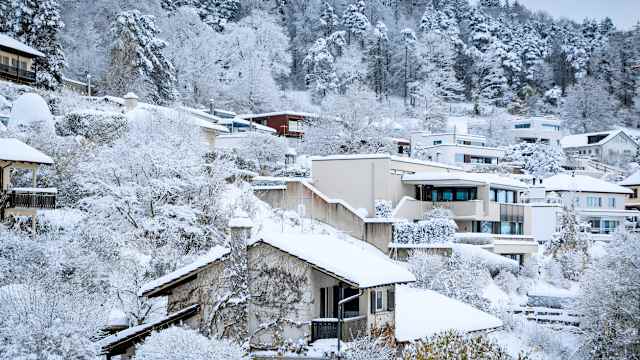Borrowing more on your mortgage: how to increase your existing mortgage
Renovating your home? Planning to buy a second home? You can finance this by borrowing more on your existing mortgage. Comparis explains when it makes sense to borrow more on your mortgage and what requirements apply.

25.08.2025

iStock/takasuu
1. Why might I consider borrowing more on my mortgage?
Major investments such as home improvements or a second home are costly. However, homeowners often have a large part of their assets tied up in their property. If you have insufficient liquidity for a major investment, you can consider borrowing more on your mortgage, under certain conditions.
2. When can I borrow more on my mortgage?
You have the option to borrow more on your mortgage in the following situations:
Are you planning a renovation, energy-related modernization work or the construction of a pool? If so, you have the option to borrow more on your mortgage.
First, determine how much the improvements will cost. A realistic cost estimate will make it easier to increase your mortgage by the appropriate amount. You can also receive a grant for energy-saving measures in your home.
Special rules apply depending on the type of renovation:
Maintaining property value: the total amount borrowed on your mortgage may not exceed two thirds of the property’s market value. This includes roof, heating and façade renovations.
Increasing property value: mortgage institutions usually let you borrow up to around 80% of your property’s market value. This includes garage, conservatory and attic extensions.
Our tip: do multiple projects at the same time and save money
Are you planning several projects on your property in quick succession? In that case, it’s advisable to carry out the projects together and increase the mortgage just once (e.g. an increase of 70,000 francs instead of two increases of 35,000 francs each).
This will save you time and money. You only have to submit the required documents once. In addition, you only have to pay the administrative fee for changing contract once.
Do you want to buy a second home? To raise equity for this, you can borrow more on your existing mortgage for your primary residence. Whether or not you qualify for the extra financing depends on the loan-to-value ratio.
Remember:
The total combined annual cost of a primary and secondary residence should not exceed around one third of your household’s income.
Buying a holiday home usually requires a larger down payment: between 25 and 50% of the property’s value, depending on the lender.
Good to know
You’re not allowed to make an early withdrawal of capital from your pension (occupational pension or pillar 3a) to buy a second home. This is only possible for purchasing property you plan to live in as your primary residence.
Do you want to borrow more money on your mortgage for a car or tuition fees? Many financial institutions can grant you a loan on your mortgage for personal use, even if you don’t intend to use that money for your property.
Have you always met your financial obligations in the past? Have you also made a larger down payment than necessary? Then you have a good chance of being able to use the mortgage loan as you see fit. Here, too, the lender must make sure that you can afford the mortgage.
Good to know
The limit for borrowing more money on your mortgage for personal use is usually 66% of the market value of the property.
3. What are the requirements for borrowing more on my mortgage?
In order for the lender to agree to an increase in your mortgage, you must meet the following requirements:
Maximum loan-to-value ratio: as a rule, the mortgage may not exceed 80% of the market value of your existing property.
Affordability: when considering an increase in your mortgage, the lender will check your financial situation again. In principle, the annual costs (interest, repayments and ancillary costs) may not exceed 33% of your gross income.
Tip: you can easily calculate the loan-to-value ratio and affordability using the Comparis mortgage calculator.
4. Borrowing more on my mortgage: what are the risks?
Borrowing more on a mortgage also comes with risk. This is particularly the case in the following situations:
Your property has lost value
When considering an increase in your mortgage, the lender will check the current value of your property. Property prices usually go up over time. However, it’s also possible that your home has lost value.
If the price falls, the maximum loan-to-value ratio also drops. In this case, the lender may refuse to provide the extra financing or may require an amortization payment.
You earn less
The lender will also verify your current income when you apply for additional financing. If it is not sufficient, the lender may demand further collateral or ask you to pay down your mortgage (unscheduled amortization).
You have miscalculated
Home improvements can quickly become more expensive than planned. In the worst case scenario, you may even have to apply for additional borrowing on your mortgage during construction work if you run out of money. So, work out your project costs as precisely as possible. Get professional support if you need it.
Additional borrowing shortly before retirement
Borrowing more on your mortgage a few years before retirement can be risky. You must pay down the mortgage to two thirds of your property value before you retire. The annual instalments can therefore rise significantly.
In addition, the affordability of the increased mortgage must also be maintained after retirement. Your income after retirement is decisive for this calculation. A reverse mortgage could be the solution.
Not sure whether you should increase your mortgage? HypoPlus, the mortgage partner of Comparis, offers comprehensive advice.
5. Example calculation: borrowing more on a mortgage
The following table shows you the total annual cost of a mortgage after an increase of 100,000 francs. As the example shows, increasing the mortgage raises the total annual cost by 9,333 francs. The calculations were made using the Comparis mortgage calculator.
| Situation when taking out the original mortgage | Situation at the time of additional financing | |
|---|---|---|
| Market value | CHF 1,000,000 | CHF 1,100,000 |
| Equity | CHF 300,000 | CHF 300,000 |
| Mortgage | CHF 700,000 | CHF 800,000 |
| Loan-to-value ratio | 70% | 73% |
| Gross annual income | CHF 142,000 | CHF 170,000 |
| Effective interest burden 5%+ | CHF 35,000 | CHF 40,000 |
| Annual amortization up to two thirds of the market value, time to retirement: 15 years (at the time of the mortgage increase) | CHF 2,224 | CHF 5,556 |
| Annual maintenance and ongoing costs | CHF 10,000 | CHF 11,000 |
| Total cost per year | CHF 47,223 | CHF 56,556 |
* The interest rate of 5% is a notional interest rate used by financial institutions to calculate the affordability of property financing in Switzerland.
This article was first published on 11.06.2021



